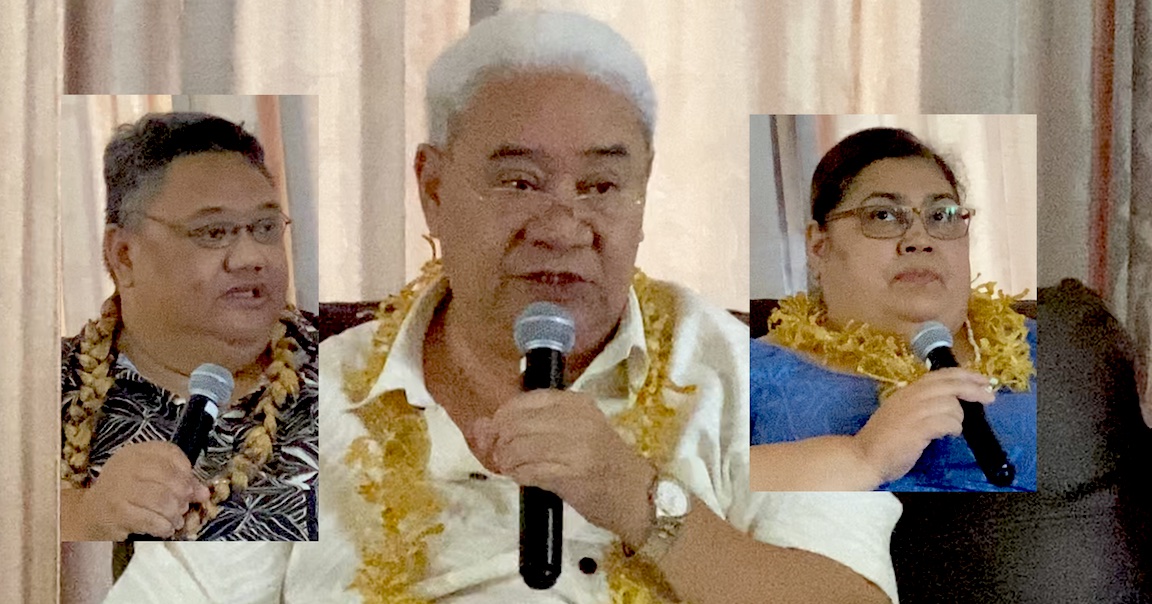(left-right) CBS Assistant Governor Seve Ben Pereira, NUS Lecturer Afualo Professor Wood Salele, Chamber of Commerce President Seuula Michelle Meredith
By Staff Writer
Seasonal workers and tourism are the two standout features in Samoa’s economic recovery following major setbacks from the COVID pandemic.
These key influencing factors in the economy’s recovery process, were highlighted in the Asian Development Bank (ADB) economic outlook report of 2023 for the Asia and Pacific region launched in Apia last Thursday.
An analysis of the benefits and challenges necessary for Samoa to continue to build on its economy, came under review during a 3-member panel discussion by local economic experts.
The National University of Samoa economic lecturer, Afualo Professor Wood Salele, President of the Chamber of Commerce Seuula Michelle Meredith and Central Bank of Samoa Assistant Governor, Seve Ben Pereira expanded on the issues.
The call on tourism was the need to diversify so the other sectors can benefit from its growth.
“Tourism can be the driver for other development sectors where it will also play a key role in meeting sustainable development goals as well,” Professor Sailele analysed.
Chamber of Commerce President Seuula agreed and gave the example of agriculture as one of the key sectors to expand into.
“There’s been a lot of Government investment in Agriculture and it would be ideal to look into the related benefits,” she noted.
The seasonal workers scheme is currently in a bind over the dilemma of labour mobility higher remittances coming in at the cost to the local business community of a depleted pool of local workers.
Seuula confirmed the loss of the home labour force to be a major concern for the business community and is hopeful there will be remedial policies in place soon.
Professor Salele, however, was wary of policies that are likely to encroach into basic human rights.
“Current minimum wages of ST$3 an hour compared to NZD$20 a hour is a big margin and the business community will have to look into that,” he counselled.
Seuula, however, agonised over the tough times the business sector is going through, when not yet fully recovered from the damaging effects of the pandemic.
“The reality is businesses are still trying to recover and it is not getting any easier because our labour force are now away for 3 years and not 9 months as it was before.”
Both agree on the need for new development policies Government must look into to keep the labour force at home while mindful of their human rights as well.
“We have to be careful not to impose policies that will prevent people from reaching out to where greener pastures are within reach, as it is their right,” Professor Sailele cautioned.
He was still mindful also of the setbacks for the business sector and urged the need for Government to subsidise the recovery struggles by the business community.
The impacts of tourism and of higher remittances from seasonal work, are welcomed relief by the Central Bank of Samoa.
Assistant Governor, Seve Ben Pereira, reflected on the struggles by Government to service its debts when everything virtually came to a standstill during the COVID pandemic.
“Our rebounding tourism and the higher remittances levels from our labour mobility workforce are helping to get us back into our debt repayment flow again,” Seve sighed in grateful comfort.
The general understanding following the discussions pointed to the need for the growing tourism industry in Samoa to expand through diversification into industry related developments.
The labour mobility dilemma or loss of workers versus higher remittances to be resolved through new Government policies to encourage new work options to keep the labour force at home.
There is also a need for Government to show support for the business sector with their struggles against a depleted labour force.
